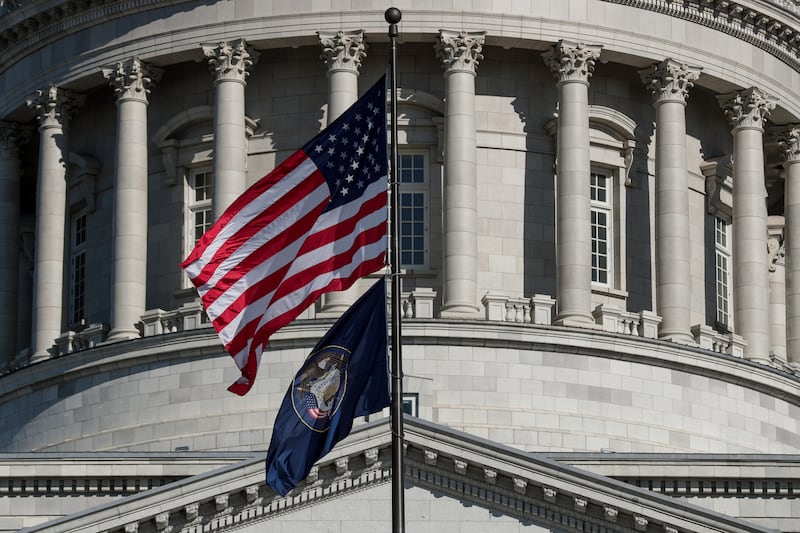SALT LAKE CITY — There isn’t enough support in the Utah Legislature to extend or modify Gov. Gary Herbert’s emergency orders related to the ongoing COVID-19 pandemic that are set to expire Thursday, the same day lawmakers will meet in special session.
That means it’s up to the governor whether to issue new versions of any or all of his expiring executive orders, which include mandating that masks be worn in state government facilities. Lawmakers gave themselves the authority earlier this year to extend, modify or repeal such orders.
“We are working closely with the legislative leadership to identify the best path forward,” Herbert spokeswoman Anna Lehnardt said.
Later, the governor’s general counsel, Ron Gordon, notified legislative officials that Herbert intended to issue seven executive orders, beginning with declaring a state of emergency due to COVID-19 and reissuing others related to the virus, including the mask mandate in state facilities and the latest version of the state’s phased reopening.
Herbert’s mandate that masks be worn in schools was not set to expire.
Wednesday, the Legislature’s Political Subdivisions Interim Committee had been set to discuss the action lawmakers were expected to take on the orders during the special session, but the committee’s Senate chairman, Sen. Jake Anderegg, R-Lehi, kicked off the meeting by announcing, “This item is not ready for prime time.”
Anderegg said between the Legislature’s Republican House and Senate leadership, and majority caucus members, “there is not support for modifications at this time nor is there support from the Legislature to extend the state of emergency.”
What’s lacking, the senator said, is a veto-proof majority.
Anderegg said the state does not need an emergency order in place to spend federal coronavirus relief funds. Lawmakers are set to allocate the remaining $150 million sent to Utah on a long list of items, including $25 million for improving state parks that have seen increased use.
The senator also said local government and school district emergency orders would not be affected, unless they were tied directly to those issued by the state. He said there might be an issue with some federal money going to the Utah National Guard, however.
Senate President Stuart Adams, R-Layton, said there’s “strong agreement” to leave it up to the governor to review his emergency orders and decide which should be extended before the midnight Thursday deadline, even though lawmakers now have that power.
Adams said emergency orders were never intended to last for long periods of time, so orders dealing with a pandemic that could go on for months likely require changes.
“I’m not sure a special session is the spot or the forum to have it be altered,” he said, because of input that should be sought, including from health experts and the public. “That can’t be done in this special session. So whether we have votes or not have votes, that wasn’t as much of an issue as to whether it’s good policy.”
The legislative commission created to oversee the state’s response to the novel coronavirus outbreak has not talked about the governor’s emergency order, the Senate president said, adding, the issue of how best to handle executive orders in a pandemic will likely wait until the 2021 Legislature, which begins meeting in January.
House Speaker Brad Wilson, R-Kaysville, said in a statement lawmakers “have encouraged the governor to review and reevaluate the more than 50 emergency orders he has issued over just the past five months and determine the appropriate next steps to manage the current pandemic.”
Wilson also said the issue will likely be considered during the 2021 Legislature. He said it is being closely monitored and that legislative leaders are continuing to discuss “the appropriate use of emergency powers” with the governor.
“While emergency powers are rightfully granted to the executive branch, they have historically been for limited to short periods of time, typically to address natural disasters,” the speaker said. “These powers were never contemplated to span months or longer.”
House Minority Leader Brian King, D-Salt Lake City, said some Republicans want to impose more significant limits on when a governor can exercise emergency powers. King said he believes it’s proper to give a governor “the tools necessary to address the effects of any situation that significantly impairs our state and its people.”
Utah’s chief executive, King said, “is in a much better position, on a day-to-day basis, to appropriately adapt to facts on the ground than 104 legislators. The effects of COVID are serious. This is not the common flu.”
The governor apparently had expected to reach an agreement to continue his emergency orders.
On Tuesday, Herbert’s office had issued a statement saying he “understands legislative leadership intends to keep an emergency declaration in place. This is a crucial step to guarantee that Utah can continue accessing federal resources to aid in the state’s COVID-19 response.”



